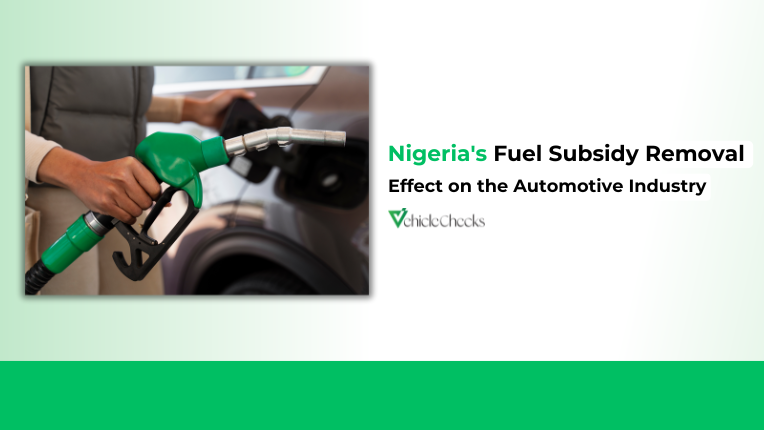Nigeria’s President Bola Tinubu in his inaugural speech on May 29, 2023 said ‘fuel subsidy is gone’, meaning the government will not be subsidizing fuel again as it has done for so many years.
The Nigerian government’s removal of subsidies has raised the prices of diesel, petrol and kerosene. It has to a greater extent affected the prices of goods and services in the different sectors of the economy especially within the automotive sector.
In this article, we will discuss the impact of fuel subsidies on car prices, with car owners abandoning their large SUVs for smaller cars such as sedans, and the government’s thirst for the transition from fuel-powered vehicles to cars that run on compressed natural gas (CNG) by 2027.
READ ALSO: Electric Cars in Nigeria: Are They Ready to Roll?
Car Owners Readjusted their Car Usage Pattern
Since the fuel subsidy was eradicated, fuel costs have increased, prompting car owners to change their usage patterns, preferring cars with lower fuel consumption.
Petrol prices rose from nearly #200/litre to as high as #530/litre, an increment of more than 62%. It has become really tough for drivers and car owners as surviving in a world without subsidies is now reserved for the privileged.
To salvage the situation, some car owners have already started changing their big cars for those that are fuel efficient coupled with those that are easy to maintain.
Are SUV Cars Giving Way to Sedan Cars?
Car enthusiasts have varying preferences when buying cars. While some prefer Sports Utility Vehicles (SUVs), others prefer sedans or saloons.
A Sedan usually has a four-door system with a separate trunk for storage, which gives the car its stylish appearance, easy and smooth handling, and fuel efficiency. An SUV has more seating capacity but is not fully efficient.
Unlike SUVs, which have six cylinders, many sedan cars are built with four cylinders. This makes SUVs have a higher fuel consumption rate than sedans, which output lower horsepower. In practical terms, a sedan car like the Toyota Corolla with a 2.0-litre engine will take about 50 litres of fuel, while a six-cylinder engine will take around 80 litres. This means that owners of a 6-cylinder engine will have to spend more to fill their tank. Likewise, a V8-engine SUV will need to spend more on fuel. By looking at a car window stickers, car buyers can easily and quickly compare the engine information and fuel efficiencies of several cars to purchase cars that are fuel-efficient enough to meet their daily needs.
The Increasing Prices of Smaller Cars
The high fuel cost has made many car owners to consider changing from their large, luxurious cars to small cars and according to findings from the dealers, the prices of these small cars, particularly the Tokunbo- foreign used cars- are on the increase.
For instance, a month after the fuel subsidy removal, the 2003 – 2005 Toyota Corolla was sold for over 4 million Naira, while the 2010 – 2012 Models, which used to be around 4 million Naira, were sold for around 6 million Naira.
It’s also surprising that the six-cylinder Lexus vehicles sold for less than the Toyota models in the Nigerian car market. While the 2005 Lexus 250i is sold for 3 million Naira, the in-demand 2005 Toyota Corolla is sold for over 4 million Naira.
If you’re a used car dealer or buyer looking for smaller cars, you should protect your investment by running a chassis number check to ascertain the vehicle’s history and prevent yourself from buying a stolen Tokunbo or a car in bad condition.
READ ALSO: 5 Big Steps to Buying Used Car in Nigeria: Used Car Buying Checklist
A Significant Drop in Car Importation
The current economic situation in Nigeria has led to a drop in the import of brand-new and Tokunbo vehicles. Aside from the consequences of fuel subsidy removal, another factor that has led to the drop in imported cars is the high cost of import duty paid by importers.
The CEO of Autocaptain Nigeria Limited, Mr Femi Olawale, told the Daily Trust Newspaper that the need to pay import duties in dollars is not helping the situation. For instance, the clearing of a 2010 Toyota Venza has risen from #250,000 to about #2.7 million.
Since many Nigerians don’t have the money to match the crazy car prices, car imports have dropped. Due to the high demand in the country, individuals looking for a Sedan car need to buy at a very high price. If this persists, smaller vehicles might become very expensive to be affordable by many Nigerians, especially low-income and mid-income earners.
The Increase in Transportation Cost
The removal of fuel subsidies in Nigeria has led to a significant increase in the cost of transportation, resulting in financial hardships. The findings by BusinessDay suggest that the cost of transportation has increased by over 100% in several states, and only a few places are still under a 50% increase. For instance, a trip of #100 in Lagos has doubled, while a trip that used to be around #200 or more has increased to #500.
Many commercial transporters have had to spend a lot of money on fuel to meet the country’s subsidy realities. This situation is already pushing many drivers out of the business and leaving them jobless. This is a significant threat to the country’s security as many will try to find a means to live by getting involved in illegal money-making businesses.
Nigerian Government Targets One Million Gas-Powered Cars to Cushion the Effect of Subsidy Removal
Reacting to the removal of fuel subsidies, the Nigerian government, under the administration of President Bola Tinubu, has initiated plans to manufacture one million Compressed Natural Gas (CNG) by 2027. The goal is to provide an alternative to petrol to lower the dependence of Nigerians on fuel engined cars for transportation.
The Presidential CNG Initiative Programme Director, Mr. Micheal Oluwagbemi made the plan known during a meeting with the Nigerian Institute of Transport Technology, FEMADEC Group and other stakeholders. The initiative will also established 1000 conversion workshops across Nigeria, thus providing jobs for over 50,000 Nigerians.
If the initiative is successful by 2027, the Director stated that Nigerian would be able to save about $20 billion in 10 years with also the possibility of managing the transport inflation in the country.
Conclusion
Nigeria’s removal of fuel subsidies has greatly affected the automotive industry by raising fuel prices and altering consumers’ car buying preferences. Car owners and buyers are shifting towards purchasing more fuel-efficient sedans instead of bigger SUVs and many are burdened with a higher cost of vehicle possession plus the cost of transportation. Yet, the low car imports and the growing demand for fuel-efficient vehicles keep the car prices increasing. With the government’s plan to adopt CNG vehicles by 2027, there are both challenges and opportunities for the industry, whose strategies require proper planning, implementation, and execution.




